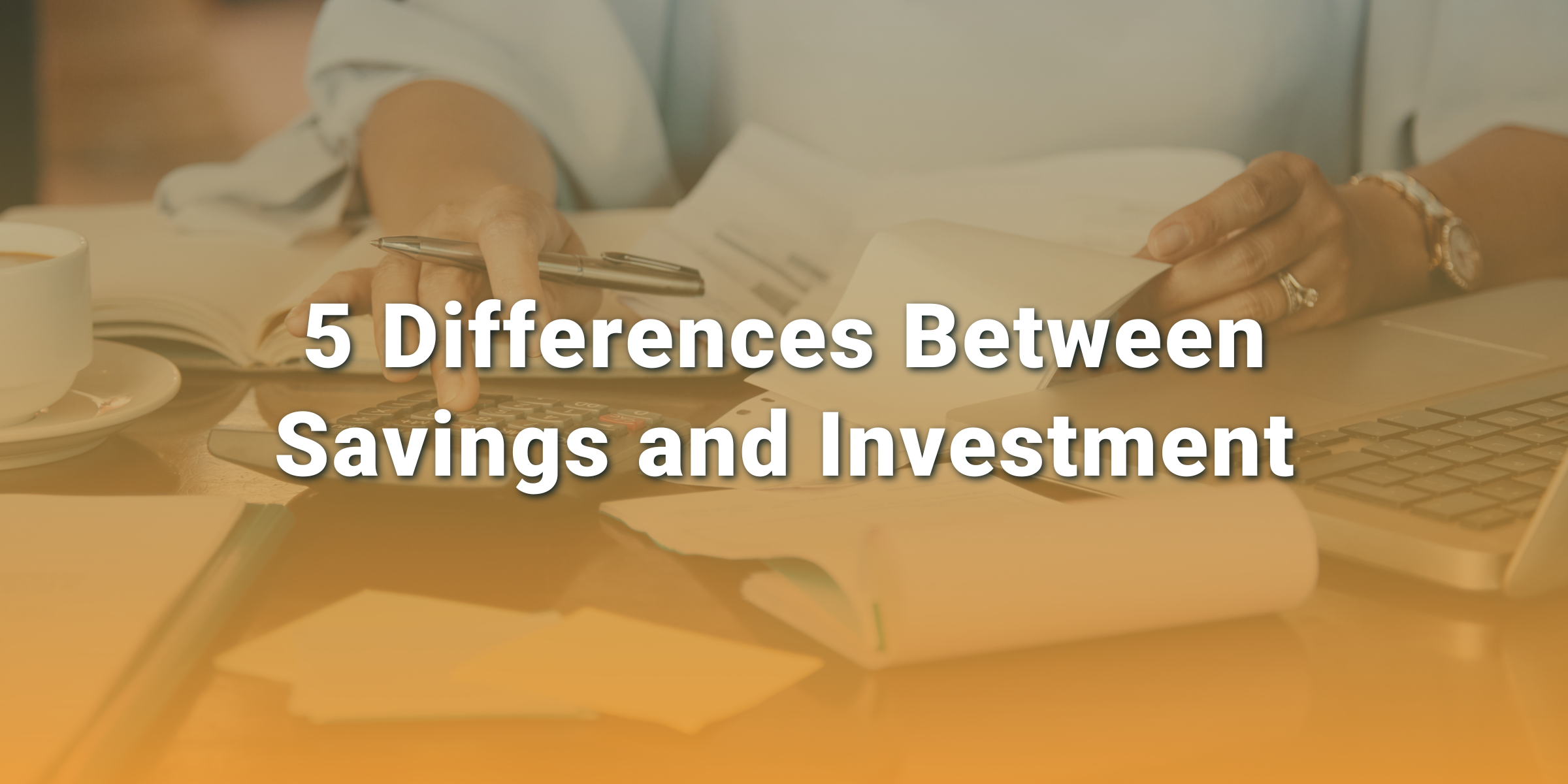In today’s gig economy, financial stability can sometimes seem elusive. Irregular income streams and lacking traditional employment benefits necessitate a savvy financial management approach. In this context, understanding two fundamental financial concepts–saving and investing–is critical.
Both saving and investing are cornerstones of sound financial management, but they serve different purposes and are influenced by other factors. Saving provides a safety net for lean times and helps meet short-term goals, while investing works as the engine of long-term wealth accumulation. The interplay of these two strategies can significantly impact your financial security, lifestyle, and future possibilities.
If you need more clarification about the differences between saving and investing, this article is for you.
[lwptoc]What are Savings?
Savings represent the income not spent but set aside for future use. You can save money in various ways, such as having a basic bank savings account.
The main purpose of savings is to provide a safety cushion when you have unexpected expenses and short-term goals or to serve as a reserve for larger purchases. Savings typically involve little to no risk, but the returns are low.
What are Investments?
Investments refer to allocating money to assets like stocks, bonds, mutual funds, real estate, or startups expecting to generate an income or profit in the future.
Unlike savings, investments are made with a longer-term perspective and aim to increase wealth over time. The returns from investments are generally higher than those from savings, but they come with varying degrees of risk. The value of investments can fluctuate, and there is a chance you’ll lose the money you’ve invested.

Advantages of Saving Money
Saving money consistently is one of the most fundamental aspects of sound financial health. It offers tremendous benefits–from providing a buffer against unexpected expenses to ensuring peace of mind during economic uncertainties. Check out the advantages below.
- A Lifeline during Emergencies
A compelling reason to save money is the creation of a financial buffer for emergencies. Life is unpredictable, and unexpected expenses such as medical bills, home repairs, or sudden travel needs could occur. Instead of borrowing or accumulating debt, a well-funded and tax-free savings account provides a safety net to tackle these unforeseen costs head-on.
- Financial Resilience in the Face of Job Loss
Another crucial advantage of savings is its role in mitigating the financial impact of job loss. The absence of a steady income can rapidly escalate everyday living expenses into a source of significant stress. Savings act as a financial cushion, helping to navigate this challenging period until a new employment opportunity materializes.
- Laying the Groundwork for Retirement
Savings play an instrumental role in retirement planning. The funds you conscientiously save today can become a substantial income source upon retirement. Along with social security benefits and pension, your savings can ensure a comfortable and stress-free retirement.
- Alleviating Financial Stress
Having money in a savings account is an effective stress reliever. Knowing that you have funds to fall back on in times of financial uncertainty contributes to overall wellbeing and reduces anxiety related to financial insecurity.
- Building Long-term Financial Security
Consistent savings contribute to long-term financial security. As savings accumulate over time, they form a sturdy foundation for future life goals. Whether purchasing a house, financing education or seeding your freelance business, a robust savings account paves the way for realizing these milestones.
- Facilitates Higher Education
Saving money can help finance higher education for yourself or your children. With the rising education costs, having a dedicated savings fund can significantly reduce the need for loans and the burden of student debt.
- Boosts Confidence in Economic Downturns
During economic recessions or personal financial downturns, having savings can boost confidence. With a financial safety net, you can weather economic instability or uncertainty better.

Disadvantages of Saving Money
While saving money is essential to financial health, it also has drawbacks. Here are some disadvantages of saving money.
- Interest Rates Are Often Low
Traditional savings accounts often offer relatively low-interest rates. On top of that, inflation can erode the real value of your savings over time. In periods of higher inflation, the purchasing power of your savings can decrease even as your account balance stays the same.
- Lack of Asset Accumulation
When you only save, you miss the opportunity to build substantial assets. Assets like stocks, bonds, or real estate have the potential to appreciate over time, offering potential returns far greater than the interest earned on savings. With investments, you may find it easier to increase your wealth significantly.
- Possible Missed Experiences and Opportunities
An excessive focus on saving could lead to missing out on valuable life experiences that often require a financial investment. Travel, education, cultural backgrounds, and social events contribute to the richness of life and can be limited if you’re overly cautious with your spending.
- Savings May Be Tempting to Access
Unlike certain investments penalizing early withdrawals, savings are easily accessible. While this is an advantage in emergencies, you may be tempted to pull out your savings for non-essential expenses, potentially disrupting your financial goals.
- Savings Don’t Provide Passive Income
Unlike investments in assets such as rental properties or dividend-paying stocks, savings do not generate a passive income. The interest earned is typically minimal and does not contribute significantly to your income. If you want your money to work while you sleep, you may need more than saving alone.

Advantages of Investing
When you invest, you make money work for you, creating an opportunity for it to generate income or increase in value over time. Here’s why you should start investing.
- Keeping Pace with Inflation
Investments, particularly those involved in the stock market and real estate, have the potential to provide returns that outpace inflation. This means that you can maintain the real value of your money and make it grow over time. This is crucial if you aim to achieve long-term goals like retirement, where it’s vital to ensure that your accumulated wealth will be sufficient to cover future costs.
- Generating Income
Certain types of investments can generate regular income. Bonds, for instance, provide periodic interest payments. Meanwhile, real estate investments can also generate income through rental fees. This income can supplement your regular earnings or even become a primary source of income, depending on the size and nature of your investments.
- Potential to Build Wealth
Investing opens doors to higher returns compared to traditional saving methods. While it comes with added risk, prudent investing in assets like stocks, bonds, or real estate can significantly increase your wealth over time. Historically, investments in these assets have demonstrated strong long-term performance, despite periods of volatility.
- Meeting Other Financial Goals
Investing can also help you meet other financial goals. For example, saving for a home might be achieved more quickly by investing, rather than merely putting money in your bank account.
- Ownership and Influence
Investing in stocks of a company makes you a partial owner. This ownership comes with certain voting rights, allowing you to participate in the company’s decision-making process and influence its direction. This can be both personally rewarding and financially beneficial.
- Diversification
Investing allows diversification, spreading your money across different types of investments (stocks, bonds, real estate, etc.) to reduce risk. This can provide a degree of protection against serious financial losses.
- Potential for Early Retirement
By investing wisely and building a substantial investment portfolio, you may accumulate enough wealth to retire early. This provides more time to enjoy the fruits of your labor and pursue activities you love.
Disadvantages of Investing
While investing can offer attractive potential returns and financial growth, it also comes with challenges and risks. Check them out below.
- Stock Prices are Risky and Volatile
One of the key disadvantages of investing, particularly in stocks, is the inherent risk and volatility. Stock prices fluctuate dramatically due to market sentiment, economic indicators, and company performance. There’s always a possibility that the value of your investment may decline, leading to potential losses.
- Expecting Too Much
Investing requires a realistic approach. Unrealistic expectations about returns can lead to disappointment and financial stress. Only some investments will yield high returns, and some may even result in losses. It’s important to balance optimism with a sound understanding of your investments’ risks and potential returns.
- Low Accessibility
Certain investments may not be easily accessible, especially if your money is tied up in fixed-term assets such as bonds, certificates of deposit, or real estate that can take time to sell. Some retirement investment accounts also penalize you for early withdrawals. Therefore, if you need money quickly, these investments may not be the most suitable.
- Requires Knowledge and Understanding
Effective investing requires an understanding of financial markets, types of investment products, and risk management strategies. Without this knowledge, you might make poor investment choices. While you can use financial advisors, this comes with additional costs.
- Can Lead to Financial Loss
Unlike savings kept in a bank, investments are not insured. This means there’s a risk of losing the money you invest. If a company you invest in performs poorly or shuts down, you could lose all your investment.
- High Entry Costs
Some types of investments require a large amount of capital to start. For example, real estate or certain mutual funds may have high entry costs. This could be a barrier for individuals with limited funds to invest.

Differences of Saving and Investing
Knowing the differences between saving and investing is key to creating an efficient financial plan. At a glance, both saving and investing involves setting aside money today for future use. However, these two concepts differ significantly in terms of their purpose, risk level, potential returns, and how they handle factors like inflation and liquidity.
- Objective
Savings typically serve short-term goals and emergencies. They’re best for less than five years away objectives, such as saving for a car, a house, or creating an emergency fund. Investment objectives are ideal for goals over five years away, like retirement or accumulating wealth over the long haul.
- Protection against Inflation
Savings usually struggle to keep up with inflation, especially today’s low-interest rates. Over time, inflation can diminish the purchasing power of money in a savings account. Investments, particularly stocks and real estate, have the potential to outperform inflation over the longer term, helping to maintain or even grow the real value of your money.
- Returns
Savings accounts offer lower returns, usually through a fixed interest rate the bank provides. The benefit here is that the returns are guaranteed. In contrast, investing can give much higher returns over the long run, particularly when investing in stocks or real estate. However, these returns are not guaranteed and can vary significantly from year to year.
- Risk
Savings are generally low risk. The main risk is the erosion of value due to inflation. Investing, on the other hand, involves higher risk. The value of investments can fluctuate, which could lead to losing some or all of the money you invest.
- Liquidity
Savings are usually highly liquid, meaning you can withdraw your money at any time. This makes savings a good option for emergency funds and other needs that might arise suddenly. Investments, depending on the type, can be less liquid. For example, while stocks and bonds traded on major exchanges can be sold relatively quickly, real estate, private company investments, and certain funds may take much longer to liquidate.
To summarize the points above:
| Saving | Investing | |
| Objective | Best for short-term goals (within 5 years), such as an emergency fund, a car purchase, or a house down payment. | Ideal for long-term objectives (over 5 years), such as retirement or wealth accumulation. |
| Protection against Inflation | Struggles to keep pace with inflation, especially with low interest rates. Over time, purchasing power can be eroded. | Has the potential to outperform inflation over the long term, helping to maintain or even grow the real value of your money. |
| Returns | Offers lower, but more predictable and guaranteed returns. | Can provide much higher potential returns over the long run, but these returns are not guaranteed and can fluctuate. |
| Risk | Generally low risk. The main risk is the erosion of value due to inflation. | Higher risk as the value of investments can fluctuate. There’s the possibility of losing some or all of the invested money. |
| Liquidity | High liquidity. You can pull out your money when you need it, making it suitable for sudden needs. | Liquidity depends on the type of investment. Some investments (e.g., stocks and bonds) can be sold quickly, while others (e.g., real estate, certain funds) may take longer to liquidate. |
When to Save and When to Invest
Whether you’re just starting with your financial journey or you’re a seasoned veteran, knowing when to save and when to invest is crucial to your financial wellbeing. This decision is often based on your financial goals, risk tolerance, timeline, and financial situation.
When to Save
Saving is a safe and liquid method to store money, suitable for short-term goals and emergency funds. If you’re planning for a near-term expenditure, say a holiday next year, or a car purchase in the next two or three years, saving is your best bet. Savings are also ideal for building an emergency fund–a cash reserve for unforeseen events like medical emergencies or quick home repairs.
Your savings account should cover 3-6 months’ worth of living expenses. This buffer can keep you afloat in case of unexpected life events without forcing you to take on debt or liquidate long-term investments.
Savings also play a vital role if you’re risk-averse. If the thought of your money’s value fluctuating makes you uneasy, keeping your money in savings, where it’s safe and accessible, might suit your peace of mind.
When to Invest
Investing is a more appropriate strategy for long-term financial goals. It’s a great financial decision to set aside money you don’t need right away. If you’re thinking about financial needs that are five or more years away, such as retirement or a child’s college fund, starting investing is typically the way to go.
The key advantage of investing is its potential to generate more significant returns than saving. Over the long term, investments in assets like stocks, bonds, or real estate have historically outpaced inflation, growing the real value of your money.
Remember, investing comes with a higher level of risk than saving. It’s important to know your risk tolerance. Investing may be the right choice if you can withstand potential short-term losses for higher potential future gains.
To wrap up, it’s crucial to know that it’s not always a binary choice between saving and investing. A balanced financial plan often includes a combination of both. Savings offer safety and liquidity for short-term needs and emergencies while investing can help you grow wealth over the long run. The trick is understanding your financial needs and risk tolerance and allocating your money accordingly.

Ready to start making smarter financial decisions?
As a freelancer, mastering your personal finances is paramount. Understanding the dynamics of saving and investing is a fundamental part of this journey, as it can shape your financial security, help weather periods of low income, and build wealth over time.
This is why Beppo–the all-in-one financial solutions app–is ideal for Filipino freelancers who want to take control of their financial health. The app helps you track your income and expenses, estimate taxes, send invoices to clients, and track your budget.
Connect with Beppo to know more. Or visit our website https://beppo.com.

